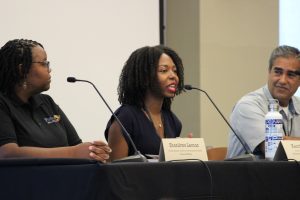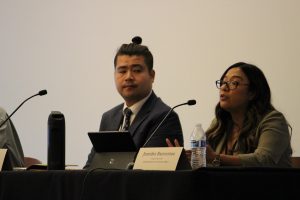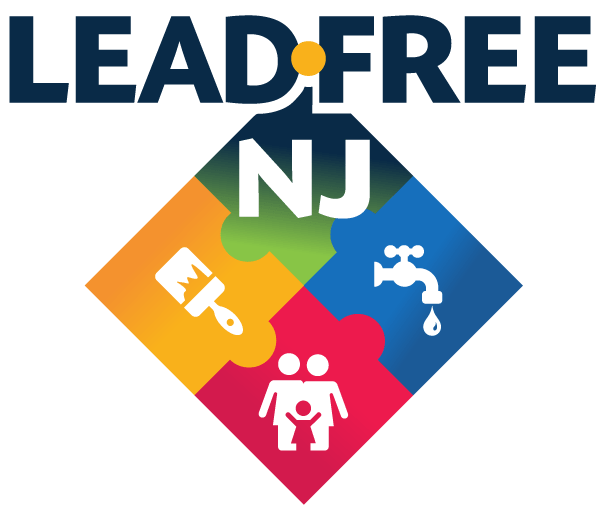Advancing Systems-Level Change through Community and Collaboration
By: Sneha Patel, New Jersey Future Communications Specialist

Pictured from left to right: Kelvin Boddy, Shanikwa Lemon, Kandyce Perry, Geovanni Cantizano, Xin “Leo” Li, Jennifer Barrientos
“Everywhere anyone looks, they should see something about lead. On the radio, billboards, everywhere, specifically in other languages,” announced Shanikwa Lemon, Program Manager, Paterson Alliance, when speaking about organizing resources and informing communities that face lead issues at the 2024 Jersey Water Works and Lead-Free New Jersey Membership Meetings.
Collaboration is essential in making strides toward lead remediation. Panelists highlighted the success of collaboration and community-driven approaches at the session “Advancing Systems-Level Change through Community and Collaboration”, which included Shanikwa Lemon; Kandyce Perry, Director, Office of Environmental Justice, NJDEP; Geovanni Cantizano, Director of Lead Programs, PRAC of Southern NJ; and Xin “Leo” Li and Jennifer Barrientos, Program Specialists, NJDCA Lead Assistance Program.
 Shanikwa Lemon (pictured left) spoke about feeling empowered as Community Hub Lead of Lead-Free NJ Collaborative which utilizes a collective impact model and enables a collaborative approach towards problem solving. As a hub leader, Lemon emphasized the necessity of spreading information about lead safety everywhere, in multiple languages. Paterson has 35 different spoken languages, mainly English, Spanish, Bengali, Arabic, and Haitian Creole. Even so, an entire group of people is left out when these resources are only printed. The average US adult reads at a 7th to 8th-grade level, and many cannot read English. Remedying this issue is where the role of a trusted communicator is valuable. “We know all of this information. What will it take to get the job done?” Lemon concluded.
Shanikwa Lemon (pictured left) spoke about feeling empowered as Community Hub Lead of Lead-Free NJ Collaborative which utilizes a collective impact model and enables a collaborative approach towards problem solving. As a hub leader, Lemon emphasized the necessity of spreading information about lead safety everywhere, in multiple languages. Paterson has 35 different spoken languages, mainly English, Spanish, Bengali, Arabic, and Haitian Creole. Even so, an entire group of people is left out when these resources are only printed. The average US adult reads at a 7th to 8th-grade level, and many cannot read English. Remedying this issue is where the role of a trusted communicator is valuable. “We know all of this information. What will it take to get the job done?” Lemon concluded.
Kandyce Perry remarked that discussing partners and collaboration is “music to [her] ears.” The government does not hold the best reputation amongst many community members, resulting in a disconnect of information and resources to those who need it. Working with partners bridges that gap. Collaboration is critical in order to work against misconceptions and distrust. “Our role can only go so far and be so effective sitting in Trenton,” Perry commented. Trusted community leaders and community communicators, who are “ears to the ground,” can be the liaisons to offer the government’s key resources, such as grants and loans to abate lead and the opportunity to influence decisions that directly affect them. “The great thing about community is it puts pressure on the government and are able to see blindspots,” Perry expressed. Partnerships with trusted communicators and letting community members know they can have a seat at the table is how we can get the right information to everyone.
Perry announced lead-related updates, including:
- In 2021, NJ State law requiring the replacement of drinking water lead service lines within ten years was established
- In 2023, New Jersey was chosen as one of four states to participate in the Environmental Protection Agency (EPA) Lead Service Line Accelerator Program, and ten communities received Technical Assistance to address existing barriers and accelerate progress
- New Jersey also has the NJ-TAP program, which allows any water system representing disadvantaged and overburdened communities the opportunity to receive free technical assistance.
- NJDEP has the PLEM Tool, which shows the potential for lead exposure based on the age of housing stock. Future updates will include data on lead in drinking water.
- In 2024, NJDEP lowered the residential soil remediation standard for lead from 400 ppm to 200 ppm based on EPA standards.
 “Not one agency or entity has all the answers, and not one institution can do it all,” Geovanni Cantizano expressed, noting how everyone at the Membership Meeting can learn from each other. Continuing the conversation, Cantizano pointed out the real efforts being made by combining government-based organizations that have an inventory of resources with organizations that do the groundwork bringing it to people. PRAC, LFNJ’s South Jersey Hub, services a large Hispanic community and there hasn’t been enough exposure to information about lead there. He emphasized that “the education piece is critical.” PRAC utilizes a dual effort, combining education and advocacy through collaboration with Lead-Free NJ with conducting free lead paint remediation and abatement under the NJ DCA LRAP program. Cantizano sums it up: “We all need to get involved, from our elected leaders, medical professionals, faith-based organizations, to organizations addressing lead. It’s very powerful when we come together.” Pictured right: Shanikwa Lemon, Kandyce Perry, Geovanni Cantizano
“Not one agency or entity has all the answers, and not one institution can do it all,” Geovanni Cantizano expressed, noting how everyone at the Membership Meeting can learn from each other. Continuing the conversation, Cantizano pointed out the real efforts being made by combining government-based organizations that have an inventory of resources with organizations that do the groundwork bringing it to people. PRAC, LFNJ’s South Jersey Hub, services a large Hispanic community and there hasn’t been enough exposure to information about lead there. He emphasized that “the education piece is critical.” PRAC utilizes a dual effort, combining education and advocacy through collaboration with Lead-Free NJ with conducting free lead paint remediation and abatement under the NJ DCA LRAP program. Cantizano sums it up: “We all need to get involved, from our elected leaders, medical professionals, faith-based organizations, to organizations addressing lead. It’s very powerful when we come together.” Pictured right: Shanikwa Lemon, Kandyce Perry, Geovanni Cantizano
Xin “Leo” Li and Jennifer Barrientos ended the session by announcing recent improvements to the DCA lead remediation and abatement program (LRAP). These include:
Lead Training Initiative
- Paid training for interested entities to become LRAP Grantees.
- 18 agencies have successfully completed training, applied for the program, and been awarded the grant to provide services throughout the state.
- Accepting new entities (ranging from non-profits to municipalities).
- Creation of a lead training institute to prepare future grantees and increase the pool of contractors.
Program Improvements
- Expanded eligibility for clients by reducing required documentation and allowing categorical eligibility.
- Creation of an online portal to streamline the application process for clients.
- Policy changes for LRAP grantees
- Separation of Program Support Costs from Average Cost Per Unit
- Increasing the percentage of payments available in advance to LRAP grantees from 50% to 90%
Marketing Efforts
- Promotional video with NJDCA’s commissioner that have aired on the news, YouTube etc.
- Audio ads in English and Spanish
- Targeted Google Ads for landlords and tenants
- Community outreach events
- Utilization of Lead inspection Law Reporting Data to refer lead-positive cases to grantees.
- Collaborating with NJAAP on Project ECHO to have more streamlined referrals to grantees.

Pictured above: Xin “Leo” LI and Jennifer Barrientos
The membership meeting is an example of the success of collaboration, bringing together professionals from all over New Jersey and opening new doors to connect and find those “trusted communicators”. Each year, we can see the effect of collborative work on system’s change and the effectiveness of thoughtful advocacy.
